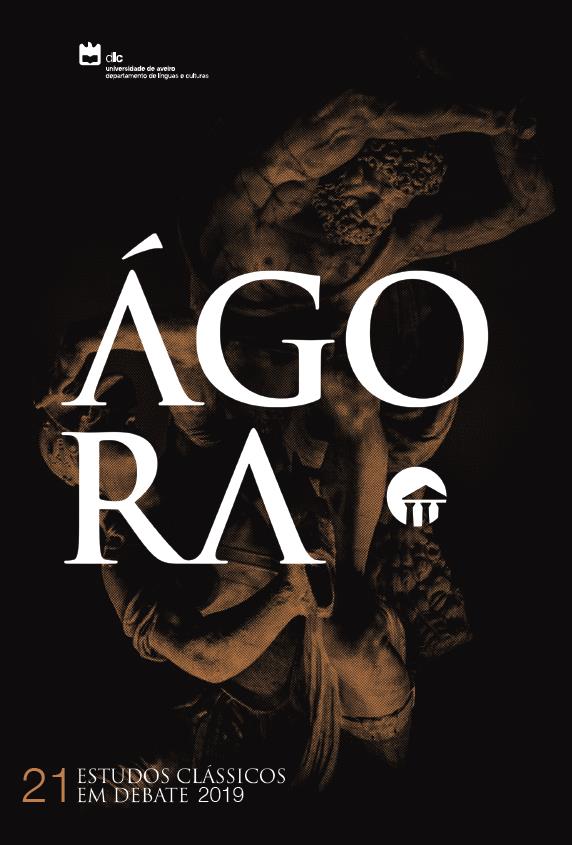El bosque y la polis
Palavras-chave:
Odisseia, Génesis, Gilgamesh, Polis
Resumo
Este texto propõe-se reconsiderar a relação que o grego antigo estabelece entre a
fundação da polis e o ‘bosque’ ou a ‘natureza’. Para isso aborda determinados problemas
interpretativos relevantes para uma leitura da Odisseia, especialmente a questão do
regresso de Ulisses do mar e da floresta. Esta leitura é complementada com duas referências
textuais clássicas (‘Génesis’ e ‘Gilgamesh’) nas quais o conhecimento como perda
adquire proeminência.
Downloads
Dados de Download não estão ainda disponíveis.
Referências
ALLEN, T. W. (1908/1917-1918), Homeri Opera, Tom. III et IV. Oxford, Oxford
Classical Texts.
ALTER, R. (1997), Genesis. Translation and Commentary. New York, W. W.
Norton.
CASEVITZ, M. (1985), Le vocabulaire de la colonisation en grec ancien. Paris,
Klincksieck.
DETIENNE, M. (2001), Apolo con el cuchillo en la mano. Madrid, Akal.
DOUGHERTY, C. (1993), Poetics of Colonization. From City to Text in Archaic
Greece. New York-Oxford, Oxford University Press.
GARVIE, A. F. (1994), Homer. Odyssey. Books VI-VIII. Cambridge, Cambridge
University Press.
GEORGE, A. (1999), The Epic of Gilgamesh. London, Penguin Classics.
HEIDEGGER, M. (2009), El arte y el espacio. Die Kunst und der Raum. Barcelona,
Herder.
MARTÍNEZ MARZOA, F. (2011), Distancias. Madrid, Abada.
MÍGUEZ BARCIELA, A. (2014), La visión de la Odisea. Madrid, La Oficina de Arte
y Ediciones.
MÍGUEZ BARCIELA, A. (2016), Mortal y fúnebre. Leer la Ilíada. Madrid, Dioptrías.
MÍGUEZ BARCIELA, A. (2017), Talar madera. Naturaleza y límite en el pensamiento
griego antiguo. Madrid, La Oficina de Arte y Ediciones.
RICHARDSON, N. (2010), Three Homeric Hymns. To Apollo, Hermes, and
Aphrodite. Cambridge, Cambridge University Press.
Classical Texts.
ALTER, R. (1997), Genesis. Translation and Commentary. New York, W. W.
Norton.
CASEVITZ, M. (1985), Le vocabulaire de la colonisation en grec ancien. Paris,
Klincksieck.
DETIENNE, M. (2001), Apolo con el cuchillo en la mano. Madrid, Akal.
DOUGHERTY, C. (1993), Poetics of Colonization. From City to Text in Archaic
Greece. New York-Oxford, Oxford University Press.
GARVIE, A. F. (1994), Homer. Odyssey. Books VI-VIII. Cambridge, Cambridge
University Press.
GEORGE, A. (1999), The Epic of Gilgamesh. London, Penguin Classics.
HEIDEGGER, M. (2009), El arte y el espacio. Die Kunst und der Raum. Barcelona,
Herder.
MARTÍNEZ MARZOA, F. (2011), Distancias. Madrid, Abada.
MÍGUEZ BARCIELA, A. (2014), La visión de la Odisea. Madrid, La Oficina de Arte
y Ediciones.
MÍGUEZ BARCIELA, A. (2016), Mortal y fúnebre. Leer la Ilíada. Madrid, Dioptrías.
MÍGUEZ BARCIELA, A. (2017), Talar madera. Naturaleza y límite en el pensamiento
griego antiguo. Madrid, La Oficina de Arte y Ediciones.
RICHARDSON, N. (2010), Three Homeric Hymns. To Apollo, Hermes, and
Aphrodite. Cambridge, Cambridge University Press.
Publicado
2019-04-01
Secção
Artigos










